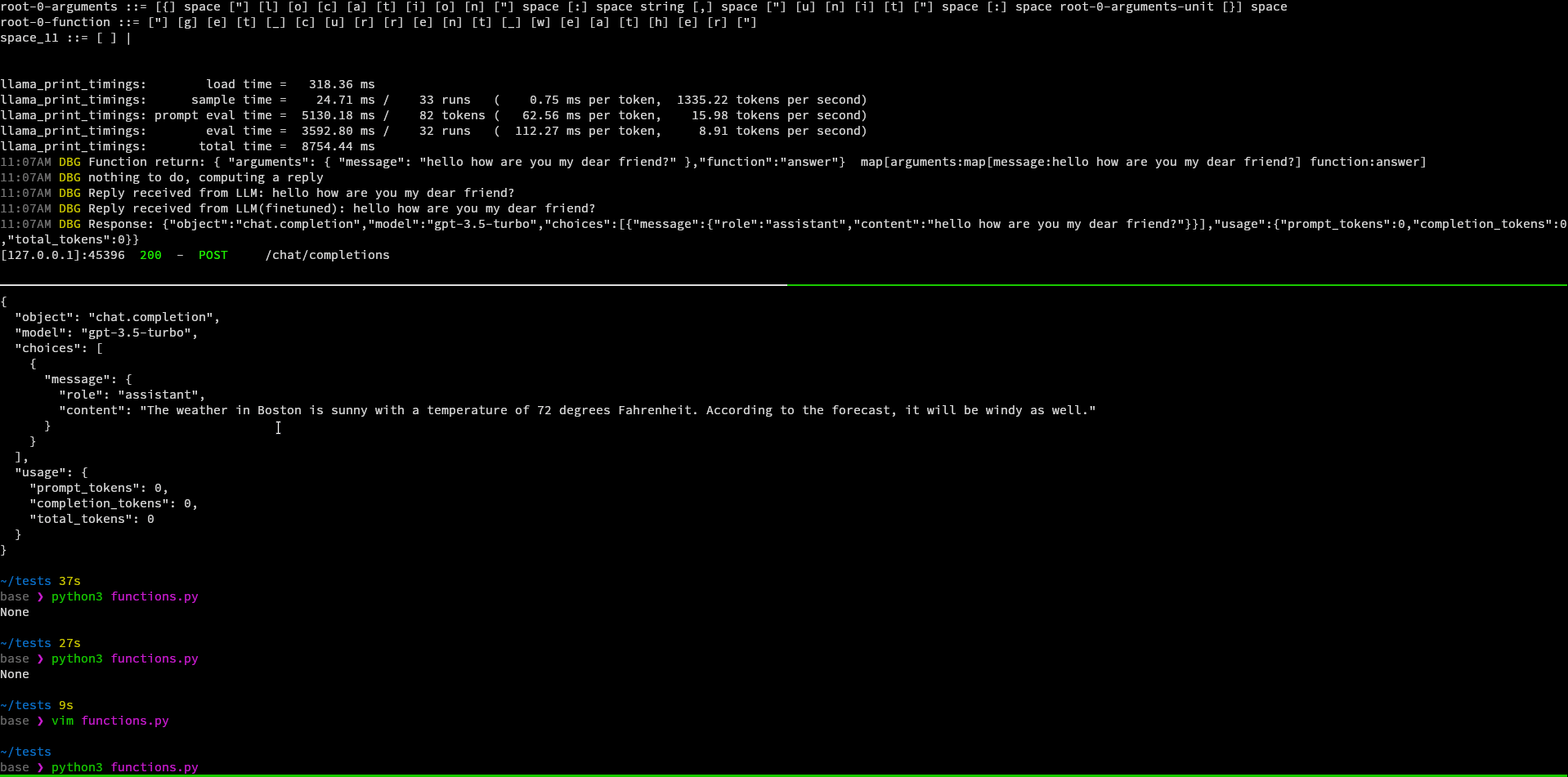mirror of
https://github.com/mudler/LocalAI.git
synced 2025-01-15 17:30:10 +00:00
127 lines
3.6 KiB
Markdown
127 lines
3.6 KiB
Markdown
|
|
|
||
|
|
+++
|
||
|
|
disableToc = false
|
||
|
|
title = "🔥 OpenAI functions"
|
||
|
|
weight = 2
|
||
|
|
+++
|
||
|
|
|
||
|
|
LocalAI supports running OpenAI functions with `llama.cpp` compatible models.
|
||
|
|
|
||
|
|

|
||
|
|
|
||
|
|
To learn more about OpenAI functions, see the [OpenAI API blog post](https://openai.com/blog/function-calling-and-other-api-updates).
|
||
|
|
|
||
|
|
💡 Check out also [LocalAGI](https://github.com/mudler/LocalAGI) for an example on how to use LocalAI functions.
|
||
|
|
|
||
|
|
## Setup
|
||
|
|
|
||
|
|
OpenAI functions are available only with `ggml` or `gguf` models compatible with `llama.cpp`.
|
||
|
|
|
||
|
|
You don't need to do anything specific - just use `ggml` or `gguf` models.
|
||
|
|
|
||
|
|
|
||
|
|
## Usage example
|
||
|
|
|
||
|
|
You can configure a model manually with a YAML config file in the models directory, for example:
|
||
|
|
|
||
|
|
```yaml
|
||
|
|
name: gpt-3.5-turbo
|
||
|
|
parameters:
|
||
|
|
# Model file name
|
||
|
|
model: ggml-openllama.bin
|
||
|
|
top_p: 80
|
||
|
|
top_k: 0.9
|
||
|
|
temperature: 0.1
|
||
|
|
```
|
||
|
|
|
||
|
|
To use the functions with the OpenAI client in python:
|
||
|
|
|
||
|
|
```python
|
||
|
|
import openai
|
||
|
|
# ...
|
||
|
|
# Send the conversation and available functions to GPT
|
||
|
|
messages = [{"role": "user", "content": "What's the weather like in Boston?"}]
|
||
|
|
functions = [
|
||
|
|
{
|
||
|
|
"name": "get_current_weather",
|
||
|
|
"description": "Get the current weather in a given location",
|
||
|
|
"parameters": {
|
||
|
|
"type": "object",
|
||
|
|
"properties": {
|
||
|
|
"location": {
|
||
|
|
"type": "string",
|
||
|
|
"description": "The city and state, e.g. San Francisco, CA",
|
||
|
|
},
|
||
|
|
"unit": {"type": "string", "enum": ["celsius", "fahrenheit"]},
|
||
|
|
},
|
||
|
|
"required": ["location"],
|
||
|
|
},
|
||
|
|
}
|
||
|
|
]
|
||
|
|
response = openai.ChatCompletion.create(
|
||
|
|
model="gpt-3.5-turbo",
|
||
|
|
messages=messages,
|
||
|
|
functions=functions,
|
||
|
|
function_call="auto",
|
||
|
|
)
|
||
|
|
# ...
|
||
|
|
```
|
||
|
|
|
||
|
|
{{% notice note %}}
|
||
|
|
When running the python script, be sure to:
|
||
|
|
|
||
|
|
- Set `OPENAI_API_KEY` environment variable to a random string (the OpenAI api key is NOT required!)
|
||
|
|
- Set `OPENAI_API_BASE` to point to your LocalAI service, for example `OPENAI_API_BASE=http://localhost:8080`
|
||
|
|
|
||
|
|
{{% /notice %}}
|
||
|
|
|
||
|
|
## Advanced
|
||
|
|
|
||
|
|
It is possible to also specify the full function signature (for debugging, or to use with other clients).
|
||
|
|
|
||
|
|
The chat endpoint accepts the `grammar_json_functions` additional parameter which takes a JSON schema object.
|
||
|
|
|
||
|
|
For example, with curl:
|
||
|
|
|
||
|
|
```bash
|
||
|
|
curl http://localhost:8080/v1/chat/completions -H "Content-Type: application/json" -d '{
|
||
|
|
"model": "gpt-4",
|
||
|
|
"messages": [{"role": "user", "content": "How are you?"}],
|
||
|
|
"temperature": 0.1,
|
||
|
|
"grammar_json_functions": {
|
||
|
|
"oneOf": [
|
||
|
|
{
|
||
|
|
"type": "object",
|
||
|
|
"properties": {
|
||
|
|
"function": {"const": "create_event"},
|
||
|
|
"arguments": {
|
||
|
|
"type": "object",
|
||
|
|
"properties": {
|
||
|
|
"title": {"type": "string"},
|
||
|
|
"date": {"type": "string"},
|
||
|
|
"time": {"type": "string"}
|
||
|
|
}
|
||
|
|
}
|
||
|
|
}
|
||
|
|
},
|
||
|
|
{
|
||
|
|
"type": "object",
|
||
|
|
"properties": {
|
||
|
|
"function": {"const": "search"},
|
||
|
|
"arguments": {
|
||
|
|
"type": "object",
|
||
|
|
"properties": {
|
||
|
|
"query": {"type": "string"}
|
||
|
|
}
|
||
|
|
}
|
||
|
|
}
|
||
|
|
}
|
||
|
|
]
|
||
|
|
}
|
||
|
|
}'
|
||
|
|
```
|
||
|
|
|
||
|
|
## 💡 Examples
|
||
|
|
|
||
|
|
A full e2e example with `docker-compose` is available [here](https://github.com/go-skynet/LocalAI/tree/master/examples/functions).
|